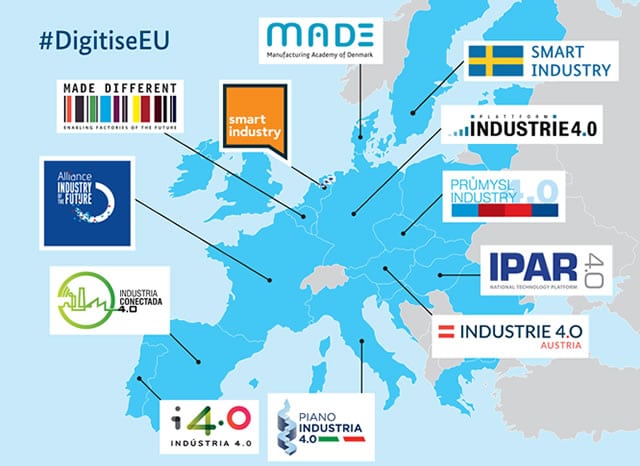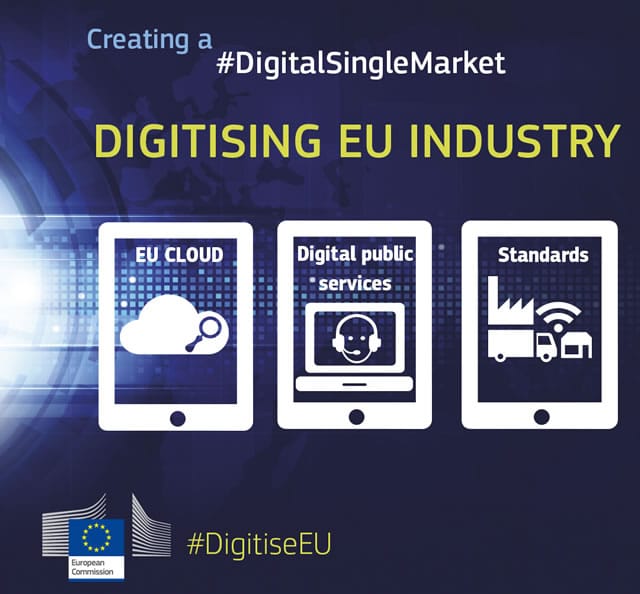On March 23rd 2017, EU countries convened in Rome for the Digital Day. The goal: enhancing cooperation between EU Member States to further drive the single digital market and prepare society and industry to leverage the benefits of digital transformation.
The Digital Day, part of the celebrations around the 60th anniversary of the Treaties of Rome, specifically looked at several topics in this regard whereby announcements and more could be followed via streaming on YouTube.
We particularly were interested in the announcements concerning the digitization and digitalization of Europe’s industry where the Internet of Things and Industry 4.0 play a key role.
A European Platform for industry transformation instead of just bilateral agreements
As tackled in our Industry 4.0 overview, several bilateral agreements have been negotiated between different EU member states to align in this sense. With Industry 4.0 Germany clearly wants to take a leading role.
That’s not just the case within the EU. As also mentioned in our Industry 4.0 overview and on our Industrial Internet of Things page, the “Industry 4.0 Platform” started collaborating with the Industrial Internet Consortium (IIC), founded by among others GE which coined the term Industrial Internet.
Since manufacturing and industry are not just a German, American, Japanese, European or Chinese given, to name a few regions/countries, where initiatives exist, it’s clear that the members of the various industry bodies are increasingly the same. With different architecture reference models things aren’t exactly simple either.
Back to the EU. At the occasion of Digital Day, the European Commission announced the launch of a European platform to connect the several national initiatives.
Seems like a better idea than bilateral collaborations as Germany’s Industry 4.0 Platform did so far. After all, isn’t one of the goals of the EU indeed to enhance collaboration at an EU level instead of via bilateral agreements?

The gathering of 12 existing and 9 coming national industry transformation initiatives
So, what does the EU plan to do with this so-called European platform for the digitization of industry (whereby digitization is really a wrong term as we explained several times)?
The first step of course is to bring together the existing initiatives within that platform. Germany’s Industrie 4.0 is well-known. We’ve also earlier mentioned France’s Alliance pour l’Industrie du Futur, the Dutch Smart Industry Initiative and Italy’s Fabbrica Intelligente (intelligent factory). Apparently the latter will be represented by another one in the platform though: Industria 4.0, which does sound familiar.
However, it’s not done. In total there are currently 12 (!) national initiatives in the EU working around the digital transformation in industry and manufacturing: the Austrians have ‘Industrie 4.0 Oesterreich’, Belgium ‘Made different – Factories of the future’, the Czech Republic ‘Průmysl 4.0’, Denmark the ‘Manufacturing Academy of Denmark (MADE)’, Spain ‘Industria Conectada 4.0’, Hungary the ‘IPAR4.0 National Technology Initiative’, Portugal ‘Indústria 4.0’ and Sweden, just like The Netherlands, ‘Smart Industry’ (Sweden also has its Produktion 2030).
Although the UK leaves the EU, it’s part of the Western-European manufacturing ecosystem and it’s important to note that also in the UK Industry 4.0 is being adopted and there are several initiatives, among others by EEF, the UK’s manufacturer’s association in the scope of what it calls a 4IR initiative (4IR stands for 4th Industrial Revolution).
Seven of the twelve (+ the UK) have a 4.0 in their names so it seems the Germans have done their job. As a matter of fact they did. As explained on our Industry 4.0 page, early 2017 there was a ‘Stakeholder Forum’ in Germany, organized by Germany’s ‘Plattform Industrie 4.0’ in the scope of the ‘Digitizing European Industry’ project of the European Commission where collaboration was on the Industry 4.0 agenda.
So, in more than one way it’s not really a surprise that now a European Platform gets launched. Moreover, on top of the twelve mentioned countries which will be in the Platform, there are nine more coming with their Industry 4.0 or Smart Industry or whatever the name initiatives.

Investing €50 billion in the EU’s industrial transformation with a focus on clean technologies
The goals of the European Platform include sharing lessons, doing joint investments, assisting in the pooling of resources and pushing the agenda of clean technologies, where the European Commission clearly wants EU companies to take a lead.
There is also money involved obviously: the EU and the EU industry together want to spend over €50 billion in the next 5 years to boost the digitalization of the European industry.
There were several other announcements at the occasion of Digital Day which we might tackle later. In the meantime you can watch all those mentioned YouTube videos from Digital Day, among others also with items on data (GDPR anyone?), connectivity (5G) and cybersecurity on YouTube.

